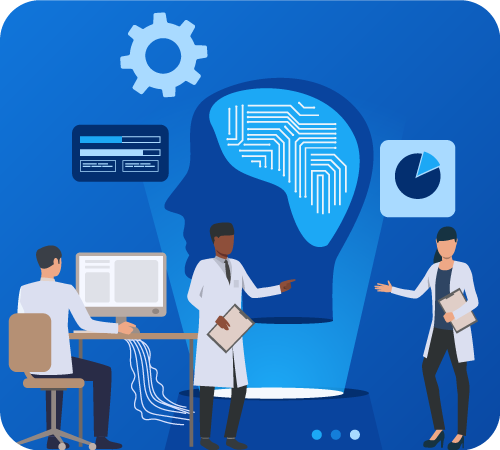Artificial intelligence in healthcare is a broader term that refers to using machine learning algorithms to human-like behavior. As the global pandemic has weakened the roots of the healthcare sector, many healthcare professionals are opting for digital solutions to overcome the new challenges. Artificial intelligence is one of the best technologies revolutionizing every sector, and the healthcare industry is no different.
AI impacts how healthcare workers diagnose diseases and care for their patients. The main aim of deep learning, natural language processing, artificial intelligence systems, and machine learning is to help professionals identify medical solutions faster and make informed clinical decisions.
AI software analyzes large healthcare data sets and identifies specific patterns and insights to improve the efficiency and outcome of the treatment provided. In this article, we’ll dive deeper into the use cases of artificial intelligence in healthcare and how AI benefits the healthcare industry.
Use Cases Of AI In Healthcare
Multiple studies suggest that AI plays a vital role in the healthcare industry and access the complex healthcare data. Here is what the studies suggest:
- Over 93% of healthcare providers strongly agree that AI and machine learning technologies help them access hidden or unobtainable value.
- 69% of healthcare companies have adopted artificial intelligence solutions for preliminary diagnosis and administrative assistance.
- As per EIT Health and McKinsey, systems powered by AI help improve patient care, drive operational gains, and support professionals in achieving better patient outcomes.
Here is the infographic representation of benefits and use cases of artificial intelligence in healthcare.
Now, let us check out the best uses of artificial intelligence in the healthcare industry.
Medical Imaging Analysis
Artificial Intelligence is one of the best tools that help healthcare experts review images and scans to gain essential insights. Instead of manually studying vast amounts of data, AI algorithms can speed up the analysis process to extract crucial information and use it for disease treatment.
Detect Breast Cancer
Regular screening has proven to reduce the risk of breast cancer by detecting it at an early stage. Timely treatments improve medicine efficiency and survival rates. AI tools work effectively, as they process images faster and provide valuable information. This, in turn, helps radiologists to provide immediate care and minimize post-disease risks.
Automate Administrative Tasks
Modern artificial intelligence and machine learning algorithms can help automate administrative tasks. Some tasks that AI can handle include:
- Healthcare claim management
- Patient records management
- Create and process clinical records faster
- Prior authorization
- Appointment booking, management, and scheduling
Natural language processing (NLP) also helps providers process information faster and better utilize health data.
Ophthalmology Care
Providing timely ophthalmology care is one of the biggest concerns for healthcare systems. Rapidly aging populations demand timely assistance from specialists. Artificial Intelligence tools compensate for gaps in screening, diagnosis, and patient care. With AI tools, they can perform population-level screening, analyze health, predict changes, and schedule timely visits.
AI Benefits In Healthcare
AI is transforming the healthcare sector. Below we have listed how Artificial intelligence may benefit healthcare in 2024 and beyond.
Accurate & Efficient Diagnosis
Misdiagnosis is a primary concern for healthcare specialists and patients. Implementing AI and digital medical solutions like computer vision helps doctors with accurate analysis of MRI reports, CT scans, mammograms, etc.
Better Patient Care
Poor communication between healthcare providers and patients can lower the efficiency levels of care. Artificial Intelligence can automate patient communication and eliminate tedious tasks like payment issues, reminders, appointment management, etc. As a result, healthcare professionals can better utilize the time saved and focus on providing better care to patients.
Improved Surgical Operations
AI-powered tools help surgeons provide safe and smart surgeries to patients. Robotic-assisted surgeries enable surgeons to achieve higher precision, flexibility, and safety and solve complicated surgery problems. Furthermore, patients that undergo robotic-assisted surgery have shorter hospital stays after the procedure, fewer post-surgery complications, and low pain scores.
Pharma companies can hire expert Al/ML engineers to better utilize the data using advanced technology. Inferenz has recently collaborated with a pharmaceutical company from Germany to help them predict health outcomes with the latest tools. Our AI/ML experts implemented the tools to help doctors understand the vital health parameters to diagnose and treat patients better.
Empower Business With Artificial Intelligence In Healthcare
Artificial Intelligence and Machine Learning algorithms help health workers drive actionable insights from the data. Medical professionals analyze large volumes of unstructured patient data sets to improve treatment decisions.
Not only does the adoption of AI in healthcare improve the care given to patients, but it also helps doctors reduce manual work with automation. If you are a medical professional wanting to leverage the advantages of artificial intelligence in healthcare, contact the team of Inferenz today!
FAQs About AI In Health
- What are the examples of Artificial Intelligence in healthcare?
Chatbots, robotic surgeries, virtual nursing assistants, etc., are a few best examples of AI in healthcare.
- Which problems can AI solve in healthcare?
AI tools are specifically designed to improve the efficiency of treatment. It can help doctors remove complexity from diagnostic procedures and eliminate repetitive and labor-intensive processes.
- How is AI used in clinical documentation?
The most common usage of AI in healthcare involves NLP applications that can access, analyze, and classify clinical documentation. The AI-powered systems can analyze unstructured patient data and give incredible insights to doctors.
- What is AI’s future in healthcare?
In the future, AI will keep automating the work of clinical and health workers. Repetitive tasks will become fully automated, so healthcare professionals can perform their jobs better and improve outcomes.










